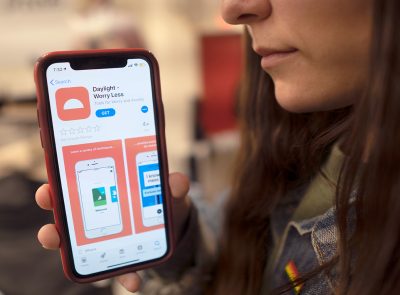
Digital therapeutics company Big Health announced the launch of their new app “Daylight,” which uses cognitive behavioral therapy to help people who struggle with anxiety, on Feb. 6. The company collaborated with experts including Boston University psychology professor Michael Otto.
According to a press release for the app, anxiety is the most common mental health issue in the United States, with 18 percent of adult Americans living with an anxiety disorder. People with anxiety, have, on average, a 93 percent higher cost of healthcare and go to the emergency room more often than their counterparts.
Otto said the purpose of the Daylight app is to be a more cost-effective and accessible way of dealing with anxiety.
“It does provide, for some people, an alternative for coming to treatment,” Otto said. “In other people, it might provide a nice compliment for coming to treatment because it can be there with you to intervene at any time you choose, and it can be there to remind you of the principles because it’s in your back pocket.”
The Daylight app’s website states that it is accepting applications to use the app for research purposes.
Otto said the design of the app, including the messages and voices used, are meant to make users feel as though they are connected to a therapist or a human in general instead of a screen.
“You can imagine how effective my therapy might be if I could follow you around and remind you of the principles of treatment that we’re working on, … [but] that would cost a fortune,” Otto said. “The beauty about putting any kind of interventions on an app is that they are right there on your smartphone with you.”
Big Health partnered with researchers at Boston University, the University of Texas, Austin, the University of Oxford, and the University of California, Los Angeles, to create the app.
The app utilizes Cognitive Behavioral Therapy, which Otto said can be beneficial in treating anxiety because it helps individuals to reflect on their ways of thinking.
“The outcome for Cognitive Behavioral Therapy certainly rivals that for medications and has terrific staying power over the long-term,” he said.
Dr. Judy Platt, director of BU Student Health Services, wrote in an email that this app has real potential to help people.
“Cognitive behavioral therapy can be very beneficial for anxiety and depression so in theory this could be very helpful,” Platt wrote.
Elise De Parcevaux, a freshman in the College of General Studies, said that she deals with anxiety by listening to music and taking a break from stressful activities.
“[It helps] sometimes just being with people and separating yourself from what’s making you anxious and then going back and trying to see if you feel better,” Parcevaux said.
Abigail Shannon, a CGS sophomore, said that prayer helps her get through tough times.
“[I] start my morning out with my favorite prayer, the serenity prayer,” Shannon said. “It says, ‘God grant me the serenity to accept the things I cannot change, courage to change the things I can, and wisdom to know the difference.’”
Tim Lupien, a sophomore in the Questrom School of Business, said that he overcame his anxieties by “changing his mindset.”
“I used to get anxious about things that are problematic, and you can’t do anything about it, but then it’s like, you can’t do anything about it, so why am I getting anxious about it?” he said. “And if there is something I can do about it I do it, I just sat for a really long time and thought about that, and then I changed my mindset.”
Ember Larregui, a freshman in the College of Communication, said that she relies on activities that make her happy to combat her anxieties.
“I’ll try to talk to my friends and do something calming with them or hang out with them or something just calming for me,” she said, “like maybe relaxing, watching some movies, watching some Netflix, stuff like that.”
















































































































